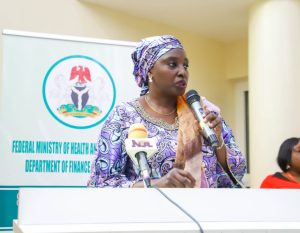Health Ministry Calls for Strategic Budgeting to Enhance Service Delivery
By Edward Samuel, Abuja
In a significant move to strengthen the health sector, the Permanent Secretary of the Federal Ministry of Health and Social Welfare, Daju Kachollom, urged agency heads to prioritize government objectives in their budget allocations for 2025.
READ ALSO:FG partners U.S.CDC to digitalise health research
Her comments came during a two-day workshop focused on reviewing the 2024 budget performance and preparing for the upcoming fiscal year, held in Abuja, the nations capital.
In a statement signed by Deputy Director (Information & Public Relations) Alaba Balogun, Kachollom said the workshop is not just a formality; “it is an essential platform for us to realign our strategies with the government’s Renewed Hope Agenda,” Kachollom stated.
She emphasized that effective budgeting is crucial for delivering quality healthcare services across the country.
Highlighting the necessity of concentrating resources, Kachollom remarked, “We must ensure that every naira spent is directed towards projects and programs that meet our government’s priorities. This is a critical time, and we must be diligent in managing our budget to provide value for money”.
The Permanent Secretary also called for a careful review of proposed projects, stating, “It is imperative that agencies justify their budget requests. We need to scrutinize every aspect to ensure that our financial resources are optimally utilized.” She added.
In her welcome address, Director of Finance and Accounts, Mrs. Bakre Modupe, echoed Kachollom’s sentiments.
“Budgeting is the backbone of our planning process. It allows us to allocate resources effectively and ensure that we are on track to meet our health sector goals”. She said.

During the workshop, the Chairman of the Committee of Chief Medical Directors and Medical Directors of Federal Tertiary Hospitals, Professor Emem Bassey, presented a stark overview of the current budgetary challenges.
“Our mandates encompass providing medical services, training, and research, but we are continually hindered by inadequate funding”. He explained.
Prof. Bassey also advocated for urgent interventions to address critical infrastructure issues, including unreliable power supply.
“Without stable electricity and adequate facilities, our ability to deliver essential health services is severely compromised”. He warned.
The discussion further highlighted the impact of these challenges on the quality of healthcare delivery.
The Permanent Secretary Daju Kachollom urged participants to develop innovative solutions that align with budgetary constraints.
“Let’s think creatively about how we can achieve our goals within our means. Collaboration and resource-sharing among institutions could be key”. She suggested.
Participants were encouraged to actively engage in the budgeting process, reflecting Kachollom’s belief in inclusive dialogue. “Your insights are invaluable; this is a collective effort. We all share the responsibility of improving our health services”. She noted.
As the workshop progressed, various stakeholders voiced their concerns about the sustainability of current health initiatives. “It’s essential to not only allocate funds but also to ensure they are spent effectively to create lasting impacts,” said a participant from a federal health institution.
Kachollom reiterated her commitment to the health sector’s progress, stating, “Together, we can navigate these challenges. By focusing on our priorities and managing our resources wisely, we will make strides towards a healthier nation”. She added.
The workshop concluded with a renewed commitment among stakeholders to align their strategies with the government’s developmental agenda, setting the stage for a more robust and responsive health sector in the coming years.


Comments are closed.